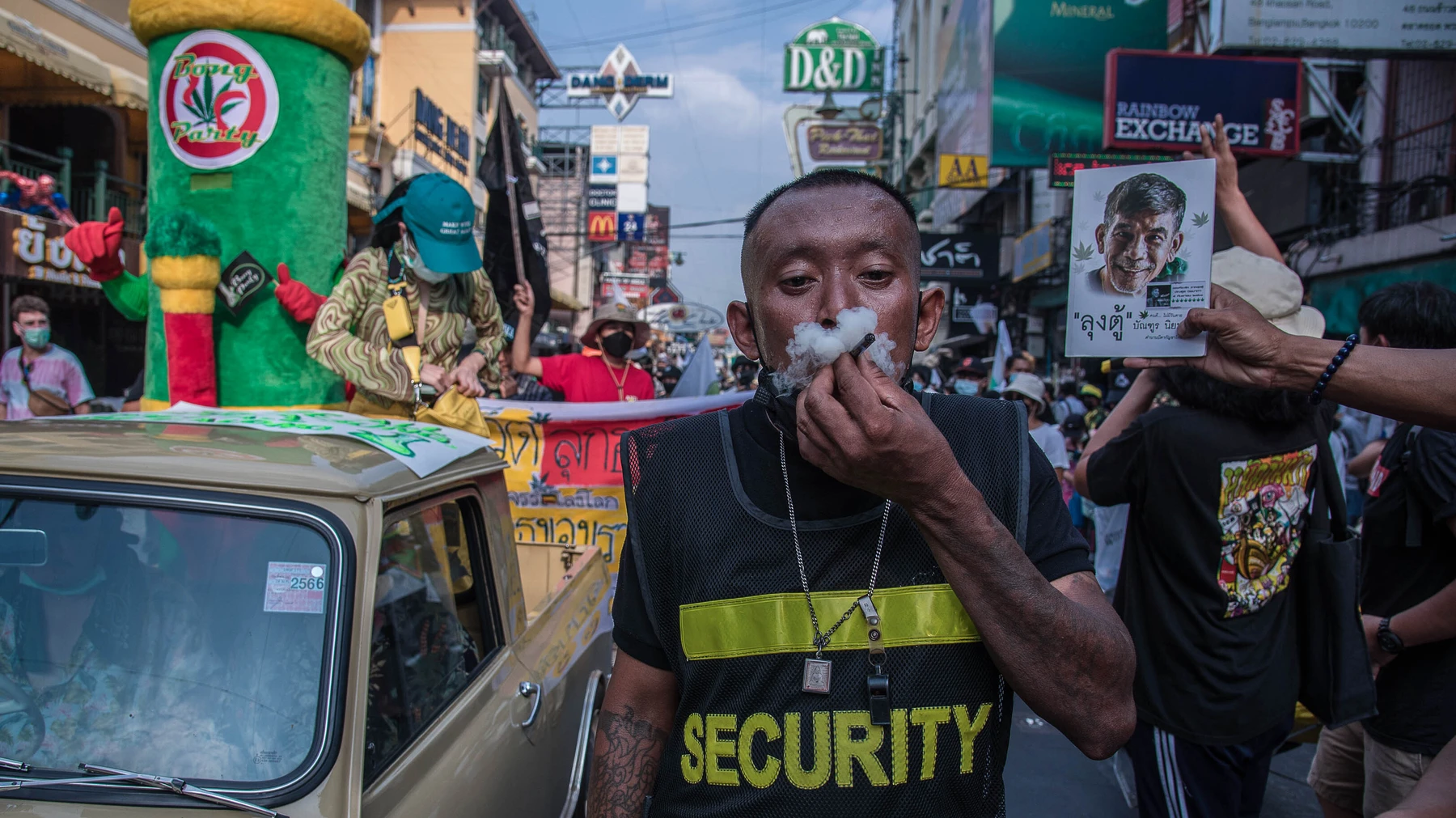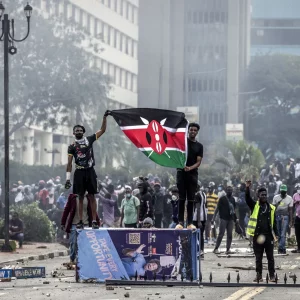Walking down the streets of Khao San Road, Patong Beach, Pattaya walking street, or any other central tourist destination in Thailand, it’s easy to see one product for sale everywhere: cannabis. But how did a country that strictly criminalized cannabis come to where it is now? The answer lies in the post-pandemic economy and political climate of Thailand.
On June 9th, 2022, the Thai government legalized the production of cannabis as well as the consumption of marijuana in food and drink. The government also took the drug off of the Class 5 list of controlled substances. Although cannabis was legalized for medicinal use in 2018, the new legislation allowed for the legal consumption of marijuana products with up to 0.2% THC content. In effect, this amount of THC is “20 to 40 times less than modern recreational cannabis designed to influence people’s state of mind would likely contain.” This means that the Thai government legally encourages the production of marijuana, not for recreational consumption but for agricultural hemp purposes. This is evidenced by the more than one million cannabis seedlings that were distributed to rural farmers in June of last year. Officially, the government only endorses marijuana consumption for medical purposes. Furthermore, Thailand prohibits smoking cannabis in public with a fine of up to 25,000 baht (about $700 USD) or three months of imprisonment. Nonetheless, cannabis has become a ubiquitous product throughout Thailand.
After all, the dispensary clients are coming in to smoke cannabis with more than 0.2% THC content. While the law officially restricts THC to 0.2%, the reality is that enforcement and regulation are extremely lax. Stores are taking their chances and making money selling pot while they can. Without active enforcement, these businesses may risk being shut down, but this risk is accepted for financial gain.
To understand why the government lobbied to legalize cannabis, this potential for profits must be understood in the context of the Thai economy. From April 2020 to July 2021, Thailand heavily restricted travel to the country due to the spread of COVID-19. Since a significant portion of the Thai economy relies heavily on tourism and the associated influx of cash, the lack of international visitors during this period severely hurt the economy. Although this effect was seen throughout the world, places such as Thailand which rely heavily on tourism experienced a particularly severe financial downturn. As a result, the government engaged in mobilizing agricultural production to stimulate the economy. As a new source of income, cannabis could present a new cutting-edge industry for the country to engage in. The Thai cannabis industry is projected to be worth $1.2 billion by 2025. For this reason, the government investigated the possibility of legalizing the cultivation of marijuana.
Once the legislation was in place, at least some of the general public viewed cannabis as a positive change to create a new market. A former co-owner of Island Exotics in Ko Samui, Thailand, who prefers to remain anonymous, is among those who support legalization. The co-owner, who opened his store in late 2022, has stated that business in the cannabis industry can be difficult because of the high competition. Nevertheless, he is hopeful for his business and does not foresee a high chance of reversal of the legislation.
“There’s always the worry the government reverses the law. But, I believe that it isn’t possible for the government to do so anymore as there are just way too many businesses now, so if they did reverse the law it would just cause trouble for everyone,” he said.
In fact, some tourists have started to call Bangkok the “Amsterdam of Asia” because the new market for cannabis has created an allure for “weed tourism.” While this could be attributed to certain negative consequences, the economic benefits of weed tourism cannot be understated. The Island Exotics co-owner claims that in Thai culture, cannabis is less frowned upon and stigmatized than in other cultures. He cites the fact that the word “bong,” a type of cannabis paraphernalia, originates from the Thai language proving that it has always been relatively present in Thai society.
A secondary, arguably more important, reason for legalization is political. Since 2020, the democracy movement spearheaded by the youth of Thailand has called for serious reforms of the country’s political institutions. Unprecedented protests spread throughout the plazas of Bangkok, with demonstrators using the ubiquitous three-finger salute to show solidarity with the movement. Although the government has restricted pro-democracy efforts, the negative sentiment towards the Thai political system and the monarchy remains. Under the incumbent coalition of the Thai parliament, the Bhumjaithai party (“Thai Pride Party”) had the most party members lobbying to legalize marijuana.
Darren Zook, a professor of Political Science and Global Studies with a focus on Southeast Asian politics at UC Berkeley, highlighted the importance of appealing to the youth for the incumbent government. Citing the democracy protests of 2020, Zook suggested that the government needed to gain political support in light of Thailand’s ongoing political strife and economic conditions. Furthermore, Zook argued that to optimize the state resources to fight drug-related crimes and the narcotics trade, the government should not be fighting the marijuana trade, but more so the methamphetamine and heroin trade—a significant source of damage to contemporary Thai society.
In fact, Thailand has seen a relative increase in gun violence, albeit incomparable to American levels of gun violence, which some have attributed to the methamphetamine trade. On October 6th, 2022 a former policeman killed 38 people, a majority of the victims being young children, in a gun and knife massacre in Northeastern Thailand. This was one of Thailand’s worst mass murders in recent history. Investigators discovered that the murderer faced a methamphetamine addiction. In light of this fact, national debates throughout Thailand have come to reevaluate the country’s issues with drugs. Although the massacre involved meth, the conversation about drugs and the recent increase in violence has given anti-cannabis groups a reason to oppose the recent legalization of marijuana, illustrating that a portion of the public’s view of marijuana has lumped it together with methamphetamines in the drug debate. The history of cannabis as a class five drug in Thailand certainly plays a role in forming public opinion. Many Thai citizens believe that the spread of cannabis has caused moral degradation and societal issues. Since legalization, cases involving “impaired consciousness” have quadrupled. Considering Thailand has one of the highest vehicle mortality rates in the world, at ninth place with over 20,000 deaths per year, arguments for increased vigilance, especially in motor vehicles, may carry weight.
On top of the social repercussions that have been attached to cannabis legalization, the opposition party, Pheu Thai, has raised some concerns with the current legislation surrounding cannabis. While the sale and consumption of cannabis have been legalized, Pheu Thai asks how efforts to regulate are being enacted. To lobby against recent legalization, the opposition party cites the lack of measures to prevent risk-averse groups, such as young teenagers and pregnant women, from using marijuana, a sentiment shared with many concerned citizens and medical professionals. Over 1,000 doctors signed a petition to urge the government to create more regulations and limitations on marijuana.
Reacting to these concerns, the government has restricted cannabis consumption to people older than 20 and people who are not pregnant or breastfeeding. Its response indicates that cannabis legalization has created an impetus for increased political discourse and change in Thailand. Although the government’s appeasement of the opposition might be in anticipation of the next voting cycle in May, the regulation shows a new willingness to cooperate with the public. Legalization could be the beginning of a new Thai government willing to act on the wishes of its citizens.
Considering the upcoming voting cycle, the effects of legalization on the general public opinion and businesses are important to make projections about the political future of the country. The Thai cannabis industry is still in flux, and the leaders of the industry are yet to be determined. Small businesses are starting to worry that big corporations may usurp a large portion of the industry. As small businesses are launched into the uncertainty of the new cannabis industry, many are using personal savings to fund their venture, making risky investments with uncertain futures. Wealthy corporations have more financial resources to invest relative to their smaller counterparts, posing a point of high contention. Nonetheless, as a result of the uncertain nature of the cannabis industry, even big businesses are still wary of any significant investment, although their fear has yet to coalesce.
The future of cannabis in Thailand is still highly uncertain. Although regulation has been put into place, enforcement has yet to constrict the industry. For the time being, businesses are making profits to benefit from the legal loopholes. In response to the backlash against the lack of enforcement of cannabis laws, the government engaged with the public and initiated a dialogue that led to a change in policy. As the next voting cycle comes closer, cannabis laws may be the beginning of a more collaborative democracy in Thailand.
Featured Image Source: Peerapon Boonyakiat






Comments are closed.